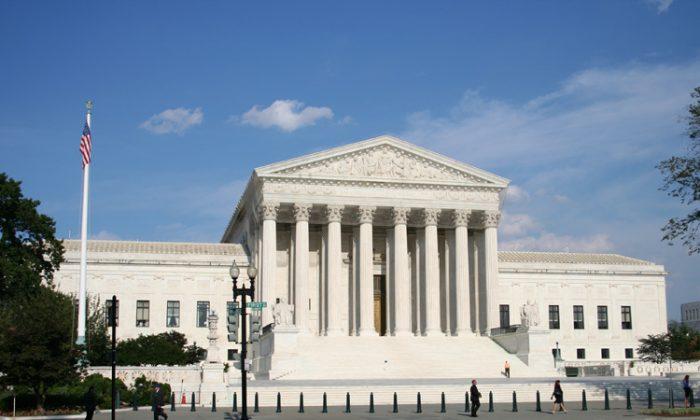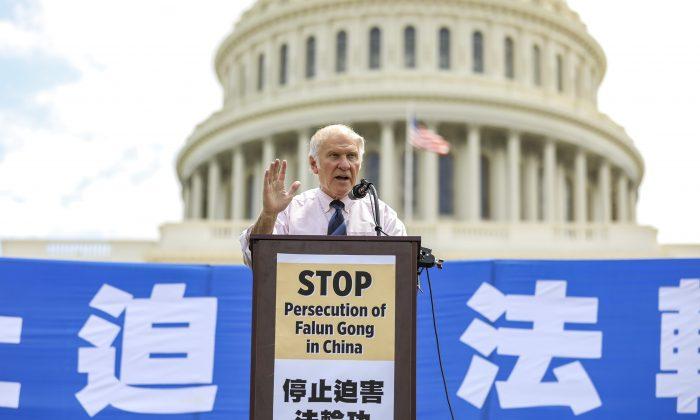WASHINGTON—In what is expected to be one of the most significant rulings by the high court in decades, the U.S. Supreme Court will begin consideration of constitutional challenges to the Patient Protection and Affordability Care Act—commonly known as the Affordable Care Act (ACA)—March 26.
It’s been two years since President Barack Obama signed the ACA into law on March 23, 2010, and the ink was barely dry when on the same day 14 Republican state attorneys general challenged the constitutionality of the law in federal courts in Florida and Virginia.
While there were dozens of challenges filed in U.S. District Courts, only the Florida case filed in the 11th Circuit Court of Appeals has reached the Supreme Court for review.
The court has scheduled three days of hearings on March 26–28. It is expected to hand down a decision in June. More than 100 friend-of-the-court briefs (amici curiae) have been filed for this case.
The provision in the law getting the most attention is the requirement that nearly everyone must have health insurance coverage beginning in 2014, or pay a penalty. Known as the “individual mandate,” the minimum essential coverage provision of the ACA may be the best known, but not the first or only provision the court has agreed to decide.
The first issue the court must decide is whether the Anti-Injunction Act (AIA)—a federal statute that prohibits federal courts from issuing injunctions against state court proceedings—applies to the individual mandate provision of the ACA.
The mandate and its associated penalty might be construed as a form of taxation. If the court so held, the AIA prohibits suits designed to stop the law, as that would mean the suit was blocking the IRS from collecting taxes. If AIA stands, the court doesn’t have jurisdiction in the case until a monetary sanction is applied, and that can’t happen until 2015.
Consequently, if the AIA is found to apply, the court would not decide on the constitutionality of the Affordable Care Act during this election year.
If this is a tax issue, “there is a highly creditable argument that this lawsuit should not have gone forward,” said Lyle Denniston, legal journalist, who writes for the SCOTUSblog.
Denniston spoke March 15 at a forum at the National Press Club for reporters who will be covering the Supreme Court hearings on the ACA. The forum was sponsored by the Alliance for Health Reform and the Robert Wood Johnson Foundation.
Denniston opined that it isn’t a “slam dunk” win for either side.
Individual Mandate
On the second day of oral arguments, the court will take up the constitutionality of the individual mandate. Thus far, the 11th Circuit is the only federal court of appeals to find the mandate unconstitutional.
The plaintiffs argue that Congress has overstepped its constitutional powers by enacting the law. They maintain that choosing not to purchase health insurance is an “inactivity,” and the commerce clause only regulates commerce activities—not citizens who choose to opt out of interstate commerce.
“There’s no precedent for a law that forces people to engage in commerce by purchasing a private product,” said Sallie Sanford of the University of Washington School of Law, in a guest op-ed for the Jurist, explaining the plaintiff’s reasoning. If Congress can make people buy health insurance, the reasoning goes, then it could require them to purchase health food or a car to help the struggling U.S. auto industry, says a plaintiff attorney, quoted in Reuters, Feb. 16.
“Under this reasoning, the individual mandate is an expansion of Congress’s power and one that has no limits,” Sanford writes.
Forcing someone to buy insurance is a “threat to individual liberty,” said Bill McCollum, at the forum. McCollum is the former attorney general of the state of Florida, who filed the challenge to the ACA, a suit eventually joined by 25 other state attorneys general. He said the individual mandate was the first time in history that an individual is coerced to enter a market that he or she chose not to enter.
However, the defendant—the federal government—says that the individual decision not to purchase insurance will adversely affect the insurance market, and so it is engaging in interstate commerce.
“As a practical matter, there is no opting out of the health care market, since everyone eventually needs medical treatment, and very few can afford to pay their way when the time comes,” says David Cole, Georgetown University Law Center, in the New York Review of Books, Feb. 24, 2011.
It is not about individual freedom, but a matter of “how and when health care is paid for, and when health insurance is purchased,” writes Simon Lazarus, policy counsel for the National Senior Citizens Law Center, in the Daily Beast, October 2010. Lazarus spoke at the forum.
Lazarus writes that to put off buying health insurance is tantamount to having others assume the liability for one’s future medical bills. Lazarus and Cole cite the Congressional Budget Office, which estimated in 2008 the total cost of treating uninsured patients to be $43 billion—a cost shifted to others.
He added that it is only common sense that Congress should be able to act to “prevent this sort of market-timing and cost-shifting in a sector comprising 17 percent of GDP.”
Besides the commerce clause, the court will also hear arguments on the “necessary and proper clause” and Congress’s taxation power (under the general welfare clause) as alternative ways to defend the constitutionality of the individual mandate.
If the high court nullifies the individual mandate, it will then have to take up the severability issue. Briefly, this issue means the court will have to determine whether all or parts of the ACA can function as Congress intended without the requirement that everyone have health insurance.
The court has agreed to decide whether Congress had authority to compel states to expand their Medicaid programs to accommodate the additional people eligible for assistance by the ACA, or risk losing their Medicaid program.
Health Care Backers Nervous
The government side is fairly confident the court will uphold the constitutionality of the ACA. “Eminent conservative judges and Republican appointees have come down strongly in favor of upholding the mandate,” said Lazarus. He mentioned Judge Lawrence Silverman of the D.C. Circuit and Judge Jeffrey Sutton of the 6th Circuit.
But the opponents have pushed through several more court fights, and expanded their campaign to the media, where they have made the case that the federal government has too much power. Lazarus writes that it’s possible a steam-roller effect will result in the court rewriting major, well-established tenets in constitutional law.
The Hill, Jan. 18, reported that initially, liberals and some Democratic leaders regarded the suits challenging the individual mandate as “frivolous.” But their tone shifted markedly since the Supreme Court set aside six hours for arguments in the case—“a modern record.” It suggests the justices view the challenges as worthy of careful consideration.
Lyle Denniston, who has reported on the Supreme Court for 52 years, told the reporters at the forum to watch Justice Anthony Kennedy, describing him as more “passionate” about the threat of federalism than anyone else on the court. If Kennedy sees the ACA as a threat to “the sovereign dignity of the states or as a threat to individual liberty,” he will likely rule that the ACA is an “extravagant use of Congress’s power.”
The conservatives on the court may see ruling against the Affordable Care Act as an opportunity to draw the line on Congress’s power under the commerce clause.









Friends Read Free